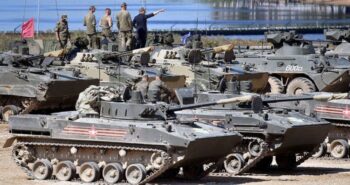By Ibrahim Moiz
 The Middle Eastern uprisings of the 2010s promised great hope and change in state-society relations. But the interference of foreign powers, insufficient organization within the uprisings, and an unhelpful international climate have enabled many states to reassert their power over society.
The Middle Eastern uprisings of the 2010s promised great hope and change in state-society relations. But the interference of foreign powers, insufficient organization within the uprisings, and an unhelpful international climate have enabled many states to reassert their power over society.
If ever proof was needed that historical convulsions can have modest beginnings, the 2010s in the Arab-majority region of the Middle East and North Africa is it.
Ten years ago, the suicide of a despairing street vendor in Tunisia sent into motion a series of uprisings that shook the region, as states faced an unprecedented challenge from their societies.
The consequences, contexts, and results of these uprisings varied enormously, ranging from genuine political transformation to civil war to proxy struggles and state reentrenchment.
Their simultaneity, however, tempted observers to characterize them in sweeping terms – as either an uplifting tale of democratic transformation or a deadly case of political destabilization. As the decade comes to an end, it offers an opportunity to review the tumultuous 2010s and attempt to draw their lessons.
The uprisings and the conflicts that ensued provided rich material for competing metanarratives.
These were bound by the idea of the “Arab street,” a historically prevalent caricature that serves to essentialize and exoticize public opinion among Arabs as a great monolith.
Supporters viewed the uprisings as a technology-driven liberation of this Arab street against repressive regimes; critics saw such regimes as necessary to stifle the same Arab street, which they perceived as dangerously prone to radicalism – a view shaped by years of security-focused perceptions of Islam as an inherently dangerous faith.
Uprisings into Wars
In reality, there are major distinctions both within the “Arab street,” and also between the countries that experienced uprisings. Several – including Syria, Egypt, Algeria, Sudan, and Libya – were officially republican dictatorships, with the military, security apparatus, or ruling party maintaining a stranglehold on the political process.
Iraq’s theoretically democratic government was in fact installed and reliant on foreign invasion and competition between the United States and Iran.
Like Lebanon, it had institutionalized confessionalism as a political mechanism; and like Yemen, it was already at war before the uprisings. The uprisings in Iraq and Yemen thus flowed into and shaped preexisting conflicts.
In Yemen, ousted dictator Ali Saleh conspired with his erstwhile opponents, the northern Houthis, to seize Sanaa from the weak coalition government of Abdrabbuh Hadi.
Forced to rely on protection by a Gulf invasion, Hadi was further challenged by a separatist coalition that controlled much of southern Yemen and have made repeated attempts to seize his makeshift capital Aden.
In Iraq, Nouri Maliki’s sectarian government drove much of the once-dominant Sunni Arab community into the arms of the millennarian Islamic State organization, which briefly but bloodily conquered western Iraq before another foreign attack, led by Iran and the United States with the support of Iraqi militias, drove it out.
Although it was far distinct from other oppositional groups, including Islamist factions, the Islamic State’s nihilistic savagery only played into the argument that an iron grip was required to crush the “Arab street.”
This argument was most destructively weaponized by Syria’s Baath dictatorship, whose pitiless crackdown at home had provoked its own war.
Tottering against a largely Sunni, partly Turkish-backed revolt, Syrian President Bashar Assad was rescued by an invasion from Russia, Iran, and militias such as the Lebanese Hezbollah.
The foreign intervention saved Assad from the fate of an unluckier dictator. Long-serving Libyan “Brother Leader” Muammar Qaddafi’s 42 years in power came to an abrupt end when he explosively threatened regional opposition in the coastal cities of Benghazi and Misrata.
Qaddafi’s long record of volatility meant that no foreign power was willing to stick its neck out in his favor. Quite the contrary, in fact, few complained when he was driven from power by a NATO-abetted opposition and eventually killed, but the preponderance of militias and regional interests that ensued soon thrust Libya into a civil war and effectively partitioned the country between rival governments in Tripoli and Tobruq.
Libya has also been critically affected by the trajectory of events in neighboring Egypt, whose military had abandoned long-serving dictator Hosni Mubarak without a fight.
But the electoral success of the Ikhwan (Muslim Brotherhood), Egypt’s long-repressed Islamist party, soon prompted a military coup against elected leader Mohamed Morsi and a ferocious crackdown in 2013.
This “counterrevolution” next door raised the stakes in Libya, whose parliament and allied militias seized Tripoli in 2014. Their opponents rallied around Egyptian-backed warlord Khalifa Haftar, who overran much of eastern Libya and ended the decade with a futile but destructive attack on Tripoli.
Peaceful Uprisings: Tunisia, Algeria, and Sudan
Arguably only Tunisia, the cradle of the regional uprisings, has emerged with a stable transition. Its own tyrant, Zinelabidine BenAli, was forced into exile by non-violent protests; and disagreements between the subsequent political camps – both supporters and opponents of the former dictator among them – have been characterized, more or less, by non-violence.
The 2019 election of an outsider widely respected for principle, Kais Saied, seems to confirm Tunisia’s case as the Arab Spring success story.
At the decade’s end, northern Africa saw two more successful uprisings – in Algeria, whose autocratic regime had been fronted by an enfeebled figurehead for two decades; and Sudan, ruled by a cynical junta for three decades. In both cases as in Egypt, the military command shepherded the transition. It is still not impossible that Sudan repeats the Egyptian experience.
Its interim government has already overseen controversial changes, including the separation of Islam from politics and the recognition of Israel; the enforcement of such measures might yet prelude an official military takeover.
Generals Abdelfattah Meet International and Regional Power Games
Indeed, the most surprising aspect of the 2010s has been the extent to which military-security establishments still influence politics in a supposedly populist era. Northern Africa featured three generals, coincidentally all with the forename Abdelfattah, who each played a different but decisive role in the trajectory of the uprisings.
Libyan Interior Minister Abdelfattah Younis decisively sided with the opposition, abandoning Qaddafi and seizing Benghazi at the start of the 2011 revolt.
Abdelfattah al-Burhan, as leader of the Sudanese interim government, has sought to preserve the military’s role by navigating the line between the establishment and opposition. And Abdelfattah al-Sisi brought the Egyptian military storming back with a vengeance in the 2013 coup. Whether against or for the uprisings, military elites continue to play decisive roles in the trajectory of events.
Another major factor that has emerged has been the role of foreign powers in influencing the regional state of affairs. The Iraqi regime proved utterly reliant on the United States, the Syrian regime on Russia, and both on Iran.
France, along with the United States, played a major role in Qaddafi’s ouster in Libya and, along with Russia, an important role in Haftar’s campaign to seize power there. Turkey has been a major backer of both the Syrian revolt and the UN-recognized Tripoli government led by Fayiz Sarraj in Libya.
Yet Arab states themselves have leapt into the fray, their competition evolving into narratives of “revolution” and “counterrevolution.” Qatar took an early lead in the 2011 Libya campaign.
Doha’s general sympathy with the “revolutionary” camps, including such groups, like the Ikhwan, that espouse political Islam, has tended to tally with Turkish ruler Recep Erdogan.
This stands in stark contrast to the United Arab Emirates, whose Crown Prince, Mohamed bin Zayed, has identified political Islam as the problem and has promoted foreign-propped autocracy as the solution to the region’s conundrums. In so doing, he wholeheartedly embraced the idea of the radical Arab street and espoused autocracy for its sake.
Bin Zayed’s strong links with several capitals that share such an outlook – Washington, Riyadh, Paris, New Delhi, and Tel Aviv among them – in turn bolstered this ideological “counterrevolution.”
The Emirates bankrolled the 2013 Egyptian coup, backing Sisi in Cairo and Burhan in Khartoum, and sent a lifeline to Assad in Damascus; like their increasingly open links with Israel, this was glibly justified as a bulwark against Iranian influence.
Abu Dhabi also flung itself enthusiastically into Libya, backing Haftar against Sarraj’s Tripoli government, and into Yemen, where it has been the major partner of Saudi Arabia’s military campaign. Yet where Riyadh, fearful of encirclement by Iran, backed the Hadi government in Yemen, the Emirates busied themselves with backing Hadi’s southern separatist rivals.
That the Saudis indulged such shenanigans owed much to the fact that bin Zayed’s protégé Mohammad bin Salman had become crown prince in Riyadh, enthusiastically if ineptly trying to ape the Abu Dhabi model.
Yet Saudi royalism and even deference to Abu Dhabi predated bin Salman. As early as the spring of 2011, Riyadh had led a Gulf military campaign into Bahrain, crushing an uprising by mostly Shia opposition on which it feared Iran would capitalize. The Saudis proved, time and again, to be their own worst enemies.
Indeed, the fact that the Houthis, their Yemeni archenemies, were able to ally with former dictactor Saleh in 2014 owed largely to the fact that three years earlier, a Gulf diplomatic mission – led by bin Zayed’s brother Abdullah – had offered the embattled dictator a lifeline out of Yemen, where he could plot his return.
Supporters of autocracy have pointed out that Gulf state monarchies have not, apart from Bahrain, been hit with significant uprisings. Though this is a slightly misleading argument – Jordan and Morocco, two monarchies without the advantage of major energy resources, have had their share of economic unrest – the fact that most Gulf regimes have ridden out the populist storm poses an intriguing question.
Whether this owes to their position as rentier states – well protected by foreign powers, with small citizenries and massive material resources – or unofficial societal methods of redistribution among that small citizenry is open to debate.
But the fact that UAE Crown Prince Mohammed bin Zayed feels compelled to mount an ideological counterrevolution across the region, fuelled by foreign arms and colonial-style warnings about the dangers of Islam and the Arab street, suggests that this stability is neither organic nor ironclad.
Possible Lessons
The record of geopolitical intrigue and factional brinksmanship that has occurred over the last decade is, of course, very different from what many protesters would have had in mind during the heady days of 2010-11.
The disappointing results might suggest that, in spite of their transient mobilizational capability, such popular aspirations as freedom or dignity are in themselves insufficient for long-lasting change when weighed against powerful state and organizational interests.
Certainly the sympathy and cooperation of people in power helps: the Syrian revolt, for instance, has undoubtedly benefited from Turkish assistance against the Iranian-Russian onslaught, while the 2011 uprisings in Tunisia and Yemen and the 2019 uprisings in Algeria and Sudan might have played out very differently had the praetorians not abandoned their dictators.
But it would be a mistake to exaggerate the point. That mass protests continued as late as 2019 in countries as far-flung as Algeria and Iraq suggests that in the state-society power balance, the state is far from impregnable.
What the 2010s do show is that mass mobilization can only go so far. It can help to remove a tyrant, but a clear, realistic, broad-based strategy for what comes after is needed; so to is a reasonably organized, disciplined sociopolitical organization.
The long-suffering Ikhwan in Egypt came tantalizingly close in 2012-13; however and against their better judgement, they succumbed to placating the maximalist rhetoric of the more radical revolutionaries without sufficiently guarding themselves against a backlash from the military establishment. That provided an opening into which the many political interests invested in their ouster pounced to bankroll the coup.
But the Ikhwan always faced an uphill task, both at home and abroad. The global environment in the 21st century is inherently unfriendly toward most political expressions of Islam.
Partly fueled by the real excesses of extremists, this fear is sustained and amplified by the securitized discourse on Islam in the post-2001 era – a discourse that feeds tyranny. The caricature of their opponents as Muslim fanatics has helped regimes as varied as Syria, Bahrain, and Egypt to justify brutal crackdowns.
Yet countries such as Saudi Arabia and Sudan have also sought to promote a specific, regime-friendly dalliance of Islam and politics, where religion legitimizes a regime that ignores its ethical restraints.
A more holistic relation between religion and politics, which respects the Islamic faith of most Arabs without jeopardizing the minority, is required to overcome the twin evils of tyranny and terrorism. But this can hardly be expected to occur in a global climate that treats Islam as a security threat.
Nevertheless, the dashed optimism of the Arab uprisings should not spark pessimism: the revolts took on a complex fight, confronting not only repressive state apparatuses but also the intrigues of foreign powers, few of which had the best interests of the people at heart.
In such climate, the overthrow of several autocratic regimes was an accomplishment that should not be belittled; the disappointing aftermath reflects more state intrigue than it does societal immaturity. The reliance of the “counterrevolution” on foreign support and colonialist stereotypes suggests that a successful uprising will involve liberation from both tyrannical regimes and foreign dependency.
***
Ibrahim Moiz is a student in history and political science at the University of Toronto. He studies political upheaval and conflict with a special focus on Afghanistan.
_________





